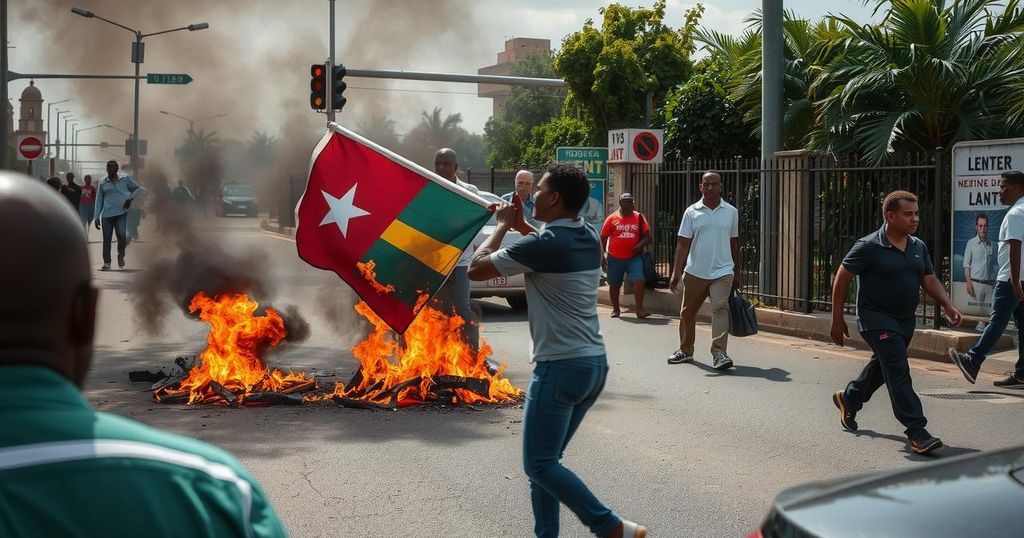Mozambique Faces Post-Election Violence and Calls for Political Reform

Mozambique is engulfed in unrest following controversial election results that extended Frelimo’s rule. Protests have erupted in major cities, leading to violence, looting, and significant disruption of daily life. With at least 248 casualties reported, opposition leaders demand accountability, while the UN calls for dialogue to resolve the crisis peacefully.
Mozambique is presently experiencing significant unrest following a disputed presidential election, leading major cities, including the capital, Maputo, to face disruptions in vital business and human activities. Following the Constitutional Council’s confirmation of election results that extended the ruling Frelimo party’s authority for an additional 50 years, opposition protests erupted, characterized by violence and looting. As transportation and trade came to a standstill, residents expressed their frustration against the government and the electoral process, with clashes between protestors and security forces escalating, resulting in numerous fatalities. Reports indicate that at least 248 individuals have died amidst the unrest, including those involved in a recent prison break that facilitated the escape of over 6,000 inmates, raising security concerns. Amidst the chaos, the United Nations has called for dialogue and peaceful resolution, urging leaders to address the ongoing crisis and restore stability.
As the situation deteriorates, Mozambicans have voiced their discontent with the ruling party’s long-standing grip on power, invoking a call for democracy. Reports of looting, violence, and deaths have become prevalent, with opposition leaders condemning the government’s handling of the protests and attributing the violence to police actions. Meanwhile, the United Nations has highlighted the urgency of confronting this crisis through dialogue and legal means to prevent further loss of life and property.
The unrest in Mozambique is rooted in the recent presidential election results, which have been widely contested. Historically, the Frelimo party has maintained a firm control over the political landscape since independence in 1975. The atmosphere of disillusionment among the populace has been compounded by allegations of vote rigging and a lack of meaningful political representation. As such, the national atmosphere is marked by heightened tensions and demands for reforms. The opposition leader’s calls for continued protests reveal a deep-seated frustration within segments of the population who believe in the potential for democratic change.
“We are willing to organize this. We are tired; after all, what is democracy for? We don’t want Frelimo anymore and we will fight. We only want the best for our country, we are tired of wars, of blood, we are tired,” – Resident in Maputo.
“It’s the police men who are prepared to rob the stores, set fire to the banks, break into the warehouses,” – Venancio Mondlane, opposition leader.
“The Secretary General is concerned about the post-election violence, which has resulted in loss of life and the destruction of public and private property,” – Stephanie Tremblay, UN Spokesperson.
The links referenced in the original text include important developments regarding Mozambique’s political unrest and the reactions of various stakeholders, including the United Nations, which has emphasized the necessity for dialogue to address the escalating tensions.
In conclusion, the political crisis enveloping Mozambique reflects heightened dissatisfaction with the ruling party and calls for democratic reforms. The violence and unrest signify a critical period in the nation’s history, where the quest for accountability and justice has become paramount. With the potential for further instability, the international community’s attention and involvement may be essential in fostering dialogue and restoring peace in the country.
Title: Mozambique Faces Post-Election Violence and Calls for Political Reform
The ongoing unrest in Mozambique stems from the recent elections that extended the ruling Frelimo party’s power for another term, a situation met with significant opposition. Since gaining independence from colonial rule in 1975, Frelimo has maintained a dominant position in Mozambique’s political landscape. The latest election results, which were widely contested and alleged to be marred by fraud, have ignited public outrage and calls for reforms. The critical situation has raised concerns about the safety of citizens, economic stability, and the overall political climate in Mozambique, leading to calls from international bodies for urgent dialogue.
The evolving crisis in Mozambique highlights the profound discontent among the populace towards the current political regime. As protests grow and violence escalates, the situation demands urgent interventions not only from national leaders but also from international organizations to guide Mozambique toward a peaceful resolution. The high stakes of this unrest underscore the need for accountable governance and a commitment to democratic principles to heal the nation and prevent future crises.
Original Source: www.dw.com







